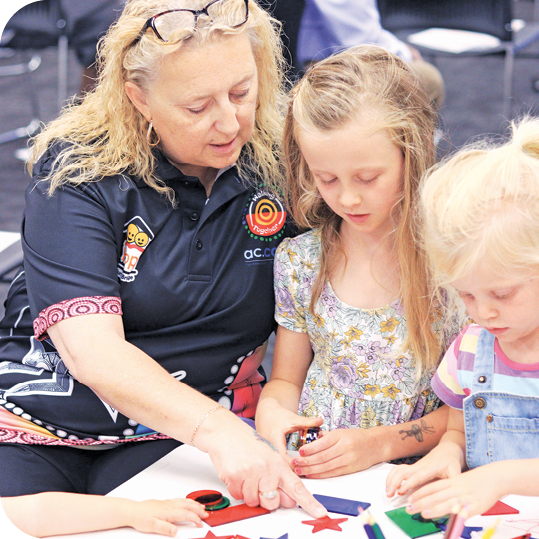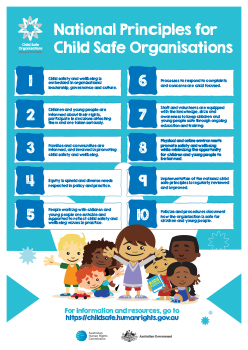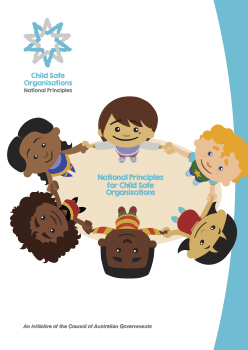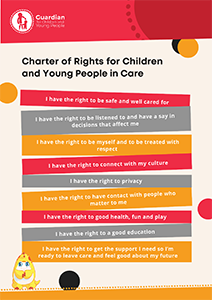
Agency Policy: Child Safety and Wellbeing
Topic: Child Safety and Wellbeing
Distribution: Board of Directors, Employees and Volunteers
Accountability: Chief Executive Officer
Version: V1 March 2022
Next Review Date: March 2023
Policy Statement
ac.care is committed to being a Child Safe Organisation and will continuously and systematically create a culture and environment where children and young people’s safety and wellbeing is at the centre of thought, values and actions. ac.care will adopt an ongoing review and continuous improvement approach to child safety and wellbeing and will ensure that the positive changes it makes will be sustained over time.
Procedure
How does ac.care’s culture promote child safety and wellbeing?
ac.care’s Board of Directors have made a public commitment to being a child safe organisation and have authorised a Child Safety and Wellbeing agency policy which guides this operational policy and procedure. This means that ac.care considers the safety and wellbeing of children and young people as a priority in all aspects of their work and meet the requirements of The Children and Young People (Safety) Act 2017 in relation to creating child safe environments.
All ac.care board directors and staff are expected to actively engage in the protection and safety of children and young people.
All child safety related policies are reviewed annually, and a new child safe environments compliance statement will be lodged with Department of Human Services each time these are updated.
There are a number of ac.care documents which guide how this culture is put into practice and outline acceptable behaviours when working with children and young people including:
• Statement of Commitment: Child Safe Organisation
• Child Safety and Wellbeing Policy (Agency)
• ac.care Way
• Code of Conduct Policy and Procedure
• Reconciliation Action Plan
How does ac.care ensure that staff can keep children and young people safe?
ac.care ensures that all board directors and staff have the knowledge, tools and support to create an environment for children and young people that keeps them safe from the risk of injury or harm.
As a child safe organisation, ac.care’s recruitment and selection practices have a particular emphasis on child safety and wellbeing. ac.care requires mandatory employment screenings of all new and current staff and board members. Staff are provided with training on commencement and throughout their employment to help them identify and respond to child safety concerns, and this education is reinforced by regular supervision which provides an opportunity to have supported conversations about child safety issues.
If a suspicion arises that an ac.care staff member poses, or may pose, an unacceptable risk to children, ac.care will advise the Department for Human Services screening unit, as outlined in the Child Safety (Prohibited Persons) Act 2016. If it is believed that the staff member may have breached the Duty of Care towards a child, the behaviour will be treated as serious and wilful misconduct, and the Performance and Discipline Policy and Procedure will be followed. Support will continue to be provided to the child or young person and consideration given to whether referrals to other services should be provided.
ac.care understands that some children and young people are particularly vulnerable, such as Aboriginal and Torres Strait Islander children, children with a disability, children from culturally and linguistically diverse backgrounds, those who are unable to live at home, lesbian, gay, bisexual, transgender and intersex children and young people, and children who have experienced trauma, and ensures that all children feel safe, welcome and included.
ac.care supports the role of the Department for Child Protection in safeguarding children and young people under the guardianship of the Chief Executive by providing support and education to foster carers registered with ac.care, as outlined by the following documents:
• Care Concerns (Foster Carers) Policy and Procedure
• Child Placement Policy and Procedure
• Foster Carer Recruitment Training and Assessment Policy and Procedure
• Foster Carer Training and Development Policy and Procedure
• Standards of Alternative Care in South Australia
• Charter of Rights for Children and Young People in Care
• National Standards for Out-of-home Care
ac.care has policies and practices in place to ensure staff are keeping children and young people safe, including:
• Access and Equity Policy and Procedure
• Care Concerns (Employees – Volunteers) Policy and Procedure
• Duty of Care Policy and Procedure
• Client Relations and Professional Boundaries Policy
• Mandatory Employment Screening Policy and Procedure
• Recruitment and Selection Policy and Procedure
• Induction process
• Mandatory Training Policy and Procedure
• Learning and Development Plan
• Client Services Supervision Policy and Procedure
• Volunteers Policy and Procedure
How does ac.care communicate and engage with children and young people and their families?
This policy, and other policies relevant to child safety and wellbeing are published on the ac.care website to ensure it is made available to all ac.care clients and community members. All existing staff are provided with the policy, and new staff will receive it as part of their induction and will be required to sign a document confirming that they have read and understood it.
ac.care has a genuine commitment to embedding client voice into everyday operations and practice to ensure that clients, including children, are active partners in informing what we do and how we do it. ac.care staff are proactive in seeking feedback from children and young people using a range of different methods of collecting and responding to the feedback, to ensure that children participate in decisions about them, and are taken seriously.
ac.care provides children, young people and their families with information about their rights and how to provide feedback about the services they receive. ac.care acknowledges that children and young people are particularly vulnerable and will provide a safe and supportive environment to discuss and raise complaints. ac.care takes a client-centred approach and as such is committed to protecting individuals’ rights of privacy and confidentiality while delivering quality services, and has clear processes in place for ensuring that feedback from and information about children and young people is collected, stored and shared in a safe and appropriate manner, including:
• Client Voice Policy and Procedure
• Client Voice Framework
• Privacy Policy and Procedure
• Complaints Policy and Procedure - External
• Information Sharing Policy and Procedure
• Information and Communication Technology Policy and Procedure
What strategies does ac.care implement to minimise risk for children and young people?
ac.care has zero tolerance for the harm or abuse of children and young people and for failing to report suspected abuse.
ac.care provides tools for staff to identify and effectively manage risks. ac.care’s risk register is a mechanism for recording, monitoring and reviewing risks, as well as developing mitigation strategies and action plans to minimise the risks. The ELT reviews the risk register at least three times per year in preparation for Audit and Risk Subcommittee and Board reporting. ac.care documents that support the commitment to minimising risk for children and young people include:
• Risk Management Policy and Procedure
• Risk Appetite Statement
• Risk Assessment form
• Risk Register
• Whistleblowers Policy and Procedure
• Records Management Policy and Procedure
What is my responsibility as a mandated notifier?
All ac.care staff are mandated notifiers, as outlined in The Children and Young People (Safety) Act of 2017. This means that if in the course of their work, they form a suspicion on reasonable grounds that a child or young person is or may be at risk of harm, they must report that suspicion as soon as possible. Failure to do so may result in a penalty of up to $10,000. ac.care will provide training to ensure that all staff understand how to make a notification, and how to recognise physical and behavioural indicators in children that may indicate risk or harm is occurring or has occurred.
Any ac.care staff member concerned about the immediate safety of a child or young person should contact SA Police on 000.
For further information about the duties of mandated notifiers, please refer to the Reporting Suspected Abuse or Neglect Policy and Procedure.
Definitions
ac.care: Anglican Community Care Incorporated which is the legal entity of the organisation.
Child or young person: A person under the age of 18 or a person apparently less than 18 years of age if the person’s age cannot be proved.
Employees: Paid staff members
At risk of harm: Physical harm or psychological harm (whether caused by an act or omission) and, without limiting the generality of this subsection, includes such harm caused by sexual, physical, mental or emotional abuse or neglect.
Staff: Employees and volunteers
Volunteer: Unpaid staff members
Supporting legislation, documents and references
Charter of Rights for Children and Young People
Child Safety (Prohibited Persons) Act 2016
Children and Young People (Safety) Act 2017
Commonwealth Child Safe Framework
Information Sharing Guidelines
Mandatory Reporting Guide
National Principles for Child Safe Organisations
National Redress Scheme
UN Convention on the Rights of the Child
Authorisation
Shane Maddocks
Chief Executive Officer
Download the Child Safety and Wellbeing Policy and Procedure .PDF file

 Central to the work and services of ac.care, is a commitment to provide our children and young people with a safe, stable and nurturing place that supports their healing and growth. We recognise, value and respect the rights of all children and young people and actively seek and listen to their voices.
Central to the work and services of ac.care, is a commitment to provide our children and young people with a safe, stable and nurturing place that supports their healing and growth. We recognise, value and respect the rights of all children and young people and actively seek and listen to their voices.











